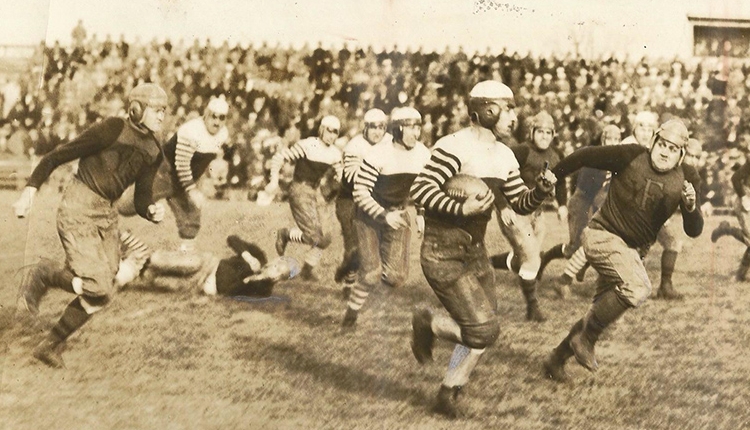
On the long and often bumpy road traveled by Philadelphia’s professional sports teams, occasionally there have been some great seasons that will never be forgotten. Those were the seasons when a team from one of Philly’s four major pro sports won a championship.
Dating back to the start of the 20th century, teams at the top level of Philadelphia’s professional sports have won 17 championships. Each one has left an indelible mark on the city’s sports history.
True, Philadelphia ranks just sixth among American cities with teams in the top four pro sports that have won titles. New York is the leader with the remarkable total of 52 titles. Boston is second with 35, followed by Chicago (24), Detroit (22), and Los Angeles (19). Following Philadelphia is Pittsburgh (14), St. Louis (13), Green Bay (13), and Baltimore (9).
But at a time when Philly’s four top teams have or may be starting to emerge from long periods of ineptitude, it is worth remembering the city’s notable champions. These are the teams whose successes the current teams would soon like to duplicate.
Some winners played long ago. The Philadelphia Athletics won the most titles in city history with five World Series winners. While winning nine American League pennants, they won the World Series in 1910, 1911, 1913, 1929, and 1930.
The Frankford Yellow Jackets (pictured at top) captured the city’s first National Football League crown in 1926. Later, the Philadelphia Eagles won NFL titles in 1948, 1949, and 1960 while going to six championship games, including two Super Bowls.

Wilt Chamberlain of the 76ers battling Bill Russell in 1967
The Philadelphia Phillies earned World Series victories in 1980 and 2008 and appeared overall in seven Series. The Philadelphia Flyers won the Stanley Cup in 1974 and 1975 while also playing in the finals seven times.
In basketball, the Philadelphia Warriors won championships in 1947 and 1956 and the 76ers claimed victories in 1967 and 1983 with the former making the finals three times and the latter going to the last round four times.
“We’ve had some really great teams,” Pat Williams, a long-time pro basketball executive, the general manager of the 1983 76ers champs and a native of the area said about the city’s title winners. “You have to realize, it’s hard to win a title. The team has to be extremely motivated. There can’t be any letdowns. And you can’t have any major injuries.”
While last place teams in Philadelphia far outnumber the championship teams, the winners have had some great players, coaches, and managers in a city that is only one of eight in the nation with pro teams in each of the four top sports.
Players such as Eddie Collins, Lefty Grove, Jimmie Foxx, Steve Carlton, Mike Schmidt, and Ryan Howard in baseball, Steve Van Buren, Pete Pihos, Chuck Bednarik, and Tommy McDonald in football, Joe Fulks, Paul Arizin, Wilt Chamberlain, and Julius Erving in basketball, and Bobby Clarke, Bernie Parent, Bill Barber, and Rick MacLeish in ice hockey are just a few of the spectacular players, most of whom are Hall of Famers, who have led their teams to championships.
Joining them have been great coaches and managers such as Connie Mack, Eddie Gottlieb, Greasy Neale, Buck Shaw, Fred Shero, Alex Hannum, Dallas Green, and Charlie Manuel.

Steve Van Buren scoring in the snow in 1948.
Each one of the championship teams has a special story. One of the greatest Philadelphia sports stories of all-time was the Eagles’ first NFL championship in 1948 when they beat the Chicago Cardinals 7-0 in a blizzard at Shibe Park before a freezing crowd of 28,864. The snow was so deep that workers, helped by some of the players, had to shovel it off the field before the game.
Like many others, Steve Van Buren didn’t think the game would be played. He stayed at his home in Lansdowne until getting a phone call from Neale who wondered where the heck he was. Admonished accordingly, Van Buren ran to a nearby trolley stop, rode to 69th Street, got the EL down Market Street to City Hall where he boarded the subway up Broad Street. He then walked through blinding snow seven blocks down Lehigh Avenue to the ballpark.
“I got there about a half hour before the start of the game, which had been delayed about one hour,” Van Buren told me many years later. When he got out on the field, “it was so bad you couldn’t even see the Cardinals safety man, and you couldn’t see when you were out of bounds because the lines on the field were covered,” he added.
So who scored the game’s only touchdown? Steve Van Buren, one of the greatest NFL running backs of all-time, crashed from the five-yard line through the snow into the end zone early in the fourth quarter.
The following year, the Eagles beat the host Los Angeles Rams, 14-0, in a game played through a driving rain storm that had turned the field into a swamp.

Tug McGraw and Paul Owens in 1980
A notable story came in 1980, when the Phillies defeated the Kansas City Royals in six games for their first World Series victory in the 97 years since they joined the National League in 1883. The Phillies downed the Houston Astros in five games in a spectacular National League Championship Series, coming back from a 5-2 deficit against Nolan Ryan to win the deciding game, 8-7, in 10 innings.
The Phils, led by Mike Schmidt, on his way to the first of three Most Valuable Player awards, then captured the World Series in six games, winning the clincher, 4-1, as Tug McGraw struck out Willie Wilson for the last out with the bases loaded. Afterward, McGraw was asked what pitch he had thrown Wilson for the final strike. “A fastball,” McGraw said. “The slowest fastball in baseball history.” What made it the slowest? Tug was quizzed. “Because it took 97 years to get there,” he said.
There have been many other memorable stories. For instance, the 1910 Athletics, playing in Shibe Park one year after it was opened, won their first championship, becoming the first American League team to win 100 or more games, capturing 102 victories while finishing 14½ games ahead of the second place New York Highlanders. That season, before an A’s game in Washington, President Howard Taft became the nation’s first chief executive to throw out the first ball on opening day, a tradition that lasted until 1971.
The Yellow Jackets, a sandlot team formed by a Frankford men’s organization in 1899 before joining the NFL in 1924, posted 10 shutouts among their 14 victories during their championship season in 1926. The team was led by fullback Houston Stockton, whose grandson, John, later became a great NBA player with the Utah Jazz. Among the Jackets’ victories was a 17-0 thrashing of the Canton Bulldogs, led by Jim Thorpe.
In 1929, the Athletics beat the Chicago Cubs in five games in the World Series.

Eddie Collins & Connie Mack of the Athletics
One of the most memorable games in Series history occurred in Game Four. Trailing 8-0, the A’s exploded for a record 10 runs in the seventh inning, led by a three-run, inside-the-park home run by Mule Haas. Jimmy Dykes’ two-run double scored the last two runs in what became a 10-8 A’s victory.
The Philadelphia Warriors became the first champion in major league basketball when they won the crown in the newly formed Basketball Association of America in 1947. Eddie Gottlieb, one of the founders of the league (which merged in 1949 with the National Basketball League to form the NBA), and one of the most prominent figures in Philadelphia sports history, was the coach. The star of the team was a former Marine named Joe Fulks, who was labeled “the father of the jump shot,” and who that season became big league basketball’s first scoring champion with 1,389 points (23.2 per game average). He scored a record 63 points in one game.
The Warriors won second title in 1956, and was led by both Paul Arizin and Neil Johnston, who combined for a total of five league scoring crowns (Johnston—a former Phillies minor league pitcher–won three). Amazingly, seven players on the roster and the coach—George Senesky—were either Philadelphia-area natives or who had played for Big Five teams. The list included Arizin, Tom Gola, Jack George, Ernie Beck, Jackie Moore, George Dempsey, and Larry Hennessy). “Homegrown talent will always attract local fans,” Gottlieb said.
Another memorable team was the 1960 Eagles who, led by quarterback Norm Van Brocklin, beat the Green Bay Packers, 17-13, in one of the great Philly sports games of all-time. The game was made especially memorable when late in the fourth quarter, Bednarik, playing both offense and defense, slammed Packers fullback Jimmy Taylor to the ground on the Eagles nine-yard line and then sat on him as the clock ran out.

Flyers greats Bobby Clarke and Bernie Parent with the Stanley Cup
With teams that featured all-time greats Bobby Clarke and Bernie Parent, the Flyers’ back-to-back championships in 1974 and 1975 produced numerous special moments, with Rick MacLeish’s game-winning goal in a 1-0 victory in the deciding game of the 1974 Stanley Cup being especially thrilling. Following that win, the city’s first major victory parade on Broad Street was held before a crowd estimated at two-million people. The Flyers won their second straight title in 1975, finishing the regular season with a 13-1 record during the final month of the season.
The 76ers, led by Wilt Chamberlain, Hal Greer, and Chet Walker, won the 1967 NBA title just four years after arriving in Philadelphia from Syracuse. They posted a 68-13 record during the regular season, at the time the best mark in NBA history. Sixteen years later, in 1983, having signed Julius Erving and Moses Malone to multi-million dollar contracts, the 76ers won another championship, sweeping a star-studded Los Angeles Lakers team led by Kareem Abdul-Jabbar and Magic Johnson.
The last crown to date was won when the Phillies grabbed a World Series victory in 2008, beating the Tampa Bay Rays in six games. The final game took two days to play due to a relentless rain storm and super-saturated wet grounds. The title was clinched by one of Philadelphia’s most popular teams of all-time. During the season, Howard led the league in home runs (46) and RBIs (146) and Brad Lidge saved 41 games in 41 opportunities. Along with that, Manuel, on his way to leading the team to two straight World Series, continued on a pace that would eventually earn him the distinction of winning the most games (780) of any manager in Phillies history.
The Phillies victory climaxed what has been a memorable collection of Philadelphia pro championships. Additions to this list are more than welcome.

